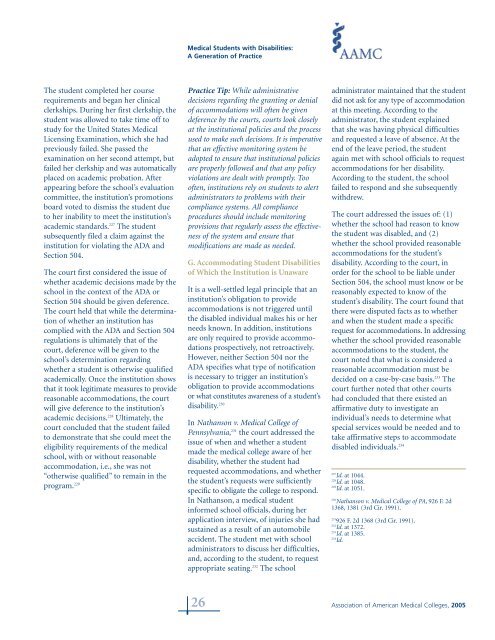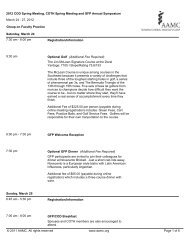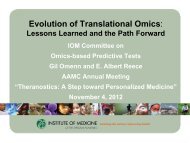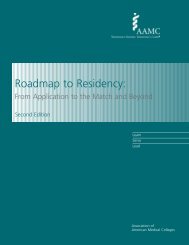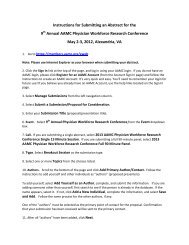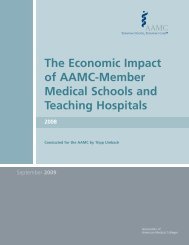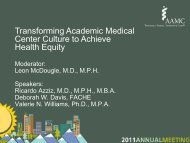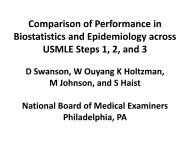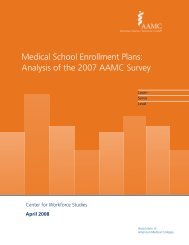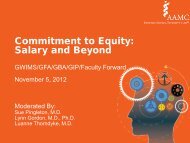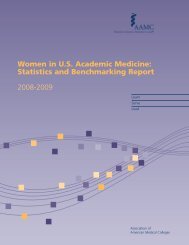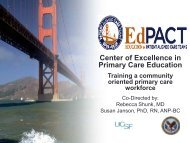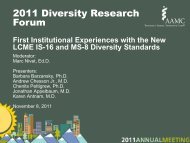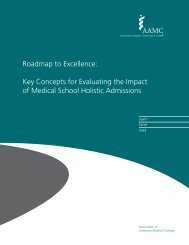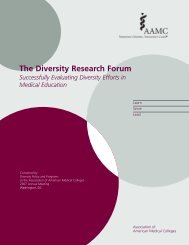Medical Students with Disabilities: A Generation of Practice
Medical Students with Disabilities: A Generation of Practice
Medical Students with Disabilities: A Generation of Practice
You also want an ePaper? Increase the reach of your titles
YUMPU automatically turns print PDFs into web optimized ePapers that Google loves.
<strong>Medical</strong> <strong>Students</strong> <strong>with</strong> <strong>Disabilities</strong>:<br />
A <strong>Generation</strong> <strong>of</strong> <strong>Practice</strong><br />
The student completed her course<br />
requirements and began her clinical<br />
clerkships. During her first clerkship, the<br />
student was allowed to take time <strong>of</strong>f to<br />
study for the United States <strong>Medical</strong><br />
Licensing Examination, which she had<br />
previously failed. She passed the<br />
examination on her second attempt, but<br />
failed her clerkship and was automatically<br />
placed on academic probation. After<br />
appearing before the school’s evaluation<br />
committee, the institution’s promotions<br />
board voted to dismiss the student due<br />
to her inability to meet the institution’s<br />
academic standards. 227 The student<br />
subsequently filed a claim against the<br />
institution for violating the ADA and<br />
Section 504.<br />
The court first considered the issue <strong>of</strong><br />
whether academic decisions made by the<br />
school in the context <strong>of</strong> the ADA or<br />
Section 504 should be given deference.<br />
The court held that while the determination<br />
<strong>of</strong> whether an institution has<br />
complied <strong>with</strong> the ADA and Section 504<br />
regulations is ultimately that <strong>of</strong> the<br />
court, deference will be given to the<br />
school’s determination regarding<br />
whether a student is otherwise qualified<br />
academically. Once the institution shows<br />
that it took legitimate measures to provide<br />
reasonable accommodations, the court<br />
will give deference to the institution’s<br />
academic decisions. 228 Ultimately, the<br />
court concluded that the student failed<br />
to demonstrate that she could meet the<br />
eligibility requirements <strong>of</strong> the medical<br />
school, <strong>with</strong> or <strong>with</strong>out reasonable<br />
accommodation, i.e., she was not<br />
“otherwise qualified” to remain in the<br />
program. 229<br />
<strong>Practice</strong> Tip: While administrative<br />
decisions regarding the granting or denial<br />
<strong>of</strong> accommodations will <strong>of</strong>ten be given<br />
deference by the courts, courts look closely<br />
at the institutional policies and the process<br />
used to make such decisions. It is imperative<br />
that an effective monitoring system be<br />
adopted to ensure that institutional policies<br />
are properly followed and that any policy<br />
violations are dealt <strong>with</strong> promptly. Too<br />
<strong>of</strong>ten, institutions rely on students to alert<br />
administrators to problems <strong>with</strong> their<br />
compliance systems. All compliance<br />
procedures should include monitoring<br />
provisions that regularly assess the effectiveness<br />
<strong>of</strong> the system and ensure that<br />
modifications are made as needed.<br />
G. Accommodating Student <strong>Disabilities</strong><br />
<strong>of</strong> Which the Institution is Unaware<br />
It is a well-settled legal principle that an<br />
institution’s obligation to provide<br />
accommodations is not triggered until<br />
the disabled individual makes his or her<br />
needs known. In addition, institutions<br />
are only required to provide accommodations<br />
prospectively, not retroactively.<br />
However, neither Section 504 nor the<br />
ADA specifies what type <strong>of</strong> notification<br />
is necessary to trigger an institution’s<br />
obligation to provide accommodations<br />
or what constitutes awareness <strong>of</strong> a student’s<br />
disability. 230<br />
In Nathanson v. <strong>Medical</strong> College <strong>of</strong><br />
Pennsylvania, 231 the court addressed the<br />
issue <strong>of</strong> when and whether a student<br />
made the medical college aware <strong>of</strong> her<br />
disability, whether the student had<br />
requested accommodations, and whether<br />
the student’s requests were sufficiently<br />
specific to obligate the college to respond.<br />
In Nathanson, a medical student<br />
informed school <strong>of</strong>ficials, during her<br />
application interview, <strong>of</strong> injuries she had<br />
sustained as a result <strong>of</strong> an automobile<br />
accident. The student met <strong>with</strong> school<br />
administrators to discuss her difficulties,<br />
and, according to the student, to request<br />
appropriate seating. 232 The school<br />
administrator maintained that the student<br />
did not ask for any type <strong>of</strong> accommodation<br />
at this meeting. According to the<br />
administrator, the student explained<br />
that she was having physical difficulties<br />
and requested a leave <strong>of</strong> absence. At the<br />
end <strong>of</strong> the leave period, the student<br />
again met <strong>with</strong> school <strong>of</strong>ficials to request<br />
accommodations for her disability.<br />
According to the student, the school<br />
failed to respond and she subsequently<br />
<strong>with</strong>drew.<br />
The court addressed the issues <strong>of</strong>: (1)<br />
whether the school had reason to know<br />
the student was disabled, and (2)<br />
whether the school provided reasonable<br />
accommodations for the student’s<br />
disability. According to the court, in<br />
order for the school to be liable under<br />
Section 504, the school must know or be<br />
reasonably expected to know <strong>of</strong> the<br />
student’s disability. The court found that<br />
there were disputed facts as to whether<br />
and when the student made a specific<br />
request for accommodations. In addressing<br />
whether the school provided reasonable<br />
accommodations to the student, the<br />
court noted that what is considered a<br />
reasonable accommodation must be<br />
decided on a case-by-case basis. 233 The<br />
court further noted that other courts<br />
had concluded that there existed an<br />
affirmative duty to investigate an<br />
individual’s needs to determine what<br />
special services would be needed and to<br />
take affirmative steps to accommodate<br />
disabled individuals. 234<br />
227<br />
Id. at 1044.<br />
228<br />
Id. at 1048.<br />
229<br />
Id. at 1051.<br />
230<br />
Nathanson v. <strong>Medical</strong> College <strong>of</strong> PA, 926 F. 2d<br />
1368, 1381 (3rd Cir. 1991).<br />
231<br />
926 F. 2d 1368 (3rd Cir. 1991).<br />
232<br />
Id. at 1372.<br />
233<br />
Id. at 1385.<br />
234<br />
Id.<br />
26 Association <strong>of</strong> American <strong>Medical</strong> Colleges, 2005


